|
|
|
Sort Order |
|
|
|
Items / Page
|
|
|
|
|
|
|
| Srl | Item |
| 1 |
ID:
088933


|
|
|
|
|
| Publication |
2009.
|
| Summary/Abstract |
This article addresses the conflict over the Euphrates and Tigris waters from the perspective of negotiation theories, by examining the role of power in upstream/downstream negotiations. Conceptual and empirical links are established between water, negotiation (structure, process), power (asymmetries, coalition dynamics, strategies, development of alternatives) and security (direct/indirect interests such as national security, border security, territorial claims, economic development and environmental concerns). The study concludes that asymmetries in power have favored upstream/downstream interactions towards bilateral if not basin-wide arrangements. The framework shows that traditional elements of power, such as upstream positions, military and economic resources, do not constitute the only sources of power. Bargaining power can also determine the dynamics between respective riparians. Time constitutes an important source of power, and interests vary over time when political settings and security concerns shift. Downstream or more vulnerable riparians can invert situations of power asymmetry by acting on the basin-dominant riparian's interests and thus reduce its alternatives. Syria's use of 'issue-linkage' in its interactions with Turkey over water and wider security issues serves as the primary example.
|
|
|
|
|
|
|
|
|
|
|
|
|
|
|
|
| 2 |
ID:
172314


|
|
|
|
|
| Summary/Abstract |
International treaties require ratification to go into effect. But while some treaties have high ratification rates, many do not, leading to a system where issues appear to be addressed on paper but are not in practice. This article seeks to address why treaties receive varying levels of support and finds that factors present during the negotiation phase of the agreement affect the ratification phase. Specifically, bargaining power at and away from the negotiation table influences both the substantive nature of the treaty and the extent to which it will be widely ratifiable. This article explores this issue both in a statistical analysis and in two pairs of qualitative case studies. The evidence indicates that negotiation processes cast a long shadow on the fate of international agreements leading to the current treaty system of prolific international law that is not ratified by most states.
|
|
|
|
|
|
|
|
|
|
|
|
|
|
|
|
| 3 |
ID:
133182
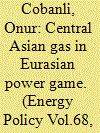

|
|
|
|
|
| Publication |
2014.
|
| Summary/Abstract |
Following the dissolution of the Soviet Union, various gas pipeline projects have been proposed to diversify transit routes and export markets of the landlocked Central Asian states. To evaluate the pipeline project's impact on the players' bargaining power, I apply the cooperate game theory to a quantitative model of the Eurasian gas trade and quantify the bargaining power structure via the Shapley value. Due to ample production capacities in Central Asia, I observe little strategic interaction between the West and China. Thus, demand competition with China is not necessarily a disadvantage for the West, and the Turkmenistan-China pipeline does not affect the impact of the westbound projects aiming Europe and Turkey. For Turkmenistan, i.e., the main supplier in the region, a link via the Caspian Sea to Turkey is the most beneficial westbound option. Although the projects carrying gas from Azerbaijan and Turkmenistan to Europe enjoy the European Commission's political support, they yield marginal benefits to the European consumers. Thanks to its transit position, Turkey collects a large share of the benefits in the East-West gas trade.
|
|
|
|
|
|
|
|
|
|
|
|
|
|
|
|
| 4 |
ID:
153561


|
|
|
|
|
| Summary/Abstract |
While emotions are widely regarded as integral to the “behavioral approach” to International Relations (IR), a host of fundamental problems have delayed the integration of affective influences into traditional models of IR. We aim to integrate affect by focusing on commitment problems, a body of work that contains strong theoretical predictions about how individual decision makers will and should act. Across two lab experiments, we use a novel experimental protocol that includes a psychophysiological measure of emotional arousal (skin conductance reactivity) to study how individuals react to changes in bargaining power. While we find support for one key pillar of IR theory—individuals do reject offers when they expect the opponent's power to increase—we also find that physiological arousal tampers with individuals’ ability to think strategically in the manner predicted by canonical models. Our follow-up experiment mimics the elements of institutional solutions to commitment problems and finds support for their efficacy on the individual level. Our novel findings suggest that when individuals face large power shifts, emotional arousal short-circuits their ability to “think forward and induct backwards,” suggesting that emotionally aroused individuals are less prone to commitment problems.
|
|
|
|
|
|
|
|
|
|
|
|
|
|
|
|
| 5 |
ID:
188845
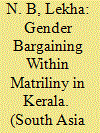

|
|
|
|
|
| Summary/Abstract |
This article presents ethnographic evidence to illustrate how Nayar women in Kerala from three different generations encounter the interplay of changed gender and property relations and seek to balance their relationships, expectations and entitlements within their natal and affinal families. Directly experiencing the dynamic intersection of property, gender and culture as well as legal and socio-cultural change, these women are seen to bargain, often quite consciously, over power and resources, including property, within patterns of matriliny that exist in a wider society influenced by dominant patriarchal norms. The article suggests that this is not as unique to Kerala as is often claimed. It makes a case, therefore, for further research on how South Asian women in the twenty-first century remain torn between matriliny and patriliny, the natal family and the husband’s family, and have to engage in multiple balancing acts to secure their rights.
|
|
|
|
|
|
|
|
|
|
|
|
|
|
|
|
| 6 |
ID:
139532
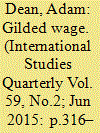

|
|
|
|
|
| Summary/Abstract |
Scholars of international political economy often argue that workers automatically share the same trade policy preferences as their employers. However, this approach assumes that trade policies that increase profits necessarily lead to increases in wages. In contrast, I argue that capital and labor are more likely to share the same trade policy preference when “profit-sharing institutions” permit capital to credibly commit that an increase in profits will lead to an increase in wages. In support of my argument, I present a structured, focused comparison of the American textile and steel workers' unions during the late nineteenth century. Both unions supported the high tariffs that protected their industries when credible profit-sharing institutions were in place, but did not support high tariffs when such institutions were absent.
|
|
|
|
|
|
|
|
|
|
|
|
|
|
|
|
| 7 |
ID:
133718


|
|
|
|
|
| Publication |
2014.
|
| Summary/Abstract |
What is the strategic role of membership in an intergovernmental group with unanimity requirements if the group negotiates with an external player in a setting with incomplete information? Being in such a group has a strategic effect compared to negotiating as a stand-alone player and reduces the demands of the outside player. Group membership lends additional bargaining power. Negotiating as a group may also cause more inefficiencies due to bargaining failure, and this may harm also the intergovernmental group. We uncover the role of preference alignment and preference independence between members of the coalition group for equilibrium payoffs and welfare effects. In this analysis, we also distinguish between coalition groups with and without side payments. Overall, coalition groups tend to perform well for the members of the coalition group in comparison to fully decentralized negotiations, particularly if the objectives of the members of the coalition group are not always perfectly aligned.
|
|
|
|
|
|
|
|
|
|
|
|
|
|
|
|
| 8 |
ID:
176906
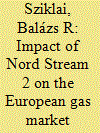

|
|
|
|
|
| Summary/Abstract |
We investigate the impact and the possible consequences of the construction of the Nord Stream 2 pipeline. We model the European gas network as a cooperative game between regions as players over the pipeline network. Our model offers several novelties compared to earlier cooperative studies. Firstly, we focus on cost saving rather than on the profits of cooperation. Secondly, we introduce liquefied natural gas as a player. Thirdly, we apply an iterative linear program to account for the long term bilateral contracts that still drive the gas market. This modelling technique also allows us to identify individual gas flows. We focus on the change of influence of the players in three different scenarios. We investigate how the power of the agents shift when the Nord Stream pipeline is expanded, when the Ukrainian pipeline is shut down and finally when both of these happen. Our calculations show that when Nord Stream 2 is operational, Russia and Western Europe improve their position compared to the base scenario, while other suppliers, notably Norway, together with Central- Eastern- and Southern Europe suffer losses, especially when the Ukrainian route is dismissed. The results highlight that both the supporters and adversaries of Nord Stream 2 are governed by self-interest and solidarity and trust, the values proclaimed by the EU and the Energy Union, remain but a slogan.
|
|
|
|
|
|
|
|
|
|
|
|
|
|
|
|
| 9 |
ID:
153848
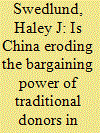

|
|
|
|
|
| Summary/Abstract |
In this article, the author explores whether the growing presence of Chinese financial assistance is decreasing the bargaining power of traditional donors vis-à-vis African governments. The article relies on data from an original survey of high-ranking donor officials working in multiple African countries, as well as case-studies of Chinese engagement in three diverse African country contexts: Ghana, Uganda and Tanzania. It finds that claims of a ‘silent revolution’ in development cooperation due to China's increased involvement in the region are overstated. Among donor officials, there is far from consensus that China is decreasing the bargaining power of their agency. On the contrary, evidence from Ghana, Tanzania and Uganda suggests that traditional development aid continues to play an important role and that, in practice, China rarely directly competes with traditional donors. There are, however, two important caveats to this claim. First, when China and traditional donors do directly compete—for example, on infrastructure projects—many recipient governments prefer assistance from China. Second, given China's interest in expanding markets and acquiring natural resources, countries receiving higher amounts of Chinese official finance are likely to have lower rates of aid dependence. As a result, financing from China is likely to be correlated with a decline in the bargaining power of traditional donors, even if it is not causing such a decline.
|
|
|
|
|
|
|
|
|
|
|
|
|
|
|
|
| 10 |
ID:
141194
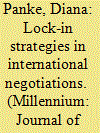

|
|
|
|
|
| Summary/Abstract |
There are hardly any instances of international negotiations, in which states do not at least partially recur to bargaining strategies. This article argues that bargaining power is ultimately a social construction, depending on perceptions about the plausibility of the realisation of a threat. Effective bargaining rests on the credibility of the threats made (e.g. no-vote, veto). Thus, even weak states can sometimes manipulate the threat-potential of seemingly more powerful actors and, thereby, punch above their weight in international negotiations. To trigger a loss of bargaining power, these states need to apply lock-in strategies that create linkages between the issue on the international negotiation agenda and other international or sub-level norms or policy commitments. Once such linkages are made, international-level bargaining threats of formerly powerful actors lose credibility as carrying them out would bring about severe reputation damages. This article distinguishes between different lock-in strategies and draws on three case studies (UNGA resolutions on African descend, on Myanmar, and on the Latin American Nuclear-Weapons-Free-Zone) to provide an empirical plausibility probe on the scope conditions under which the lock-in strategies are effective in reducing the power of seemingly strong actors in international negotiations.
|
|
|
|
|
|
|
|
|
|
|
|
|
|
|
|
| 11 |
ID:
155707
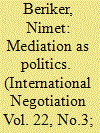

|
|
|
|
|
| Summary/Abstract |
This study proposes a conceptual model that depicts middle power mediation as a foreign policy strategy in the context of asymmetric alliance dynamics. It expands on Touval’s (2003) mediation-as-foreign policy perspective and argues that once mediation is conceived of as a viable political option in the conduct of foreign policy, engaging in mediation activity enables middle powers to create an extra space of political power not otherwise available. The article introduces an analytical model that explains the dynamics of mediation-as-foreign policy approach and the mechanisms that translate mediation engagement into political leverage. The analysis focuses on aspects of Turkish mediation efforts between 2002 and 2009 in the context of Turkish-US/EU relations.
|
|
|
|
|
|
|
|
|
|
|
|
|
|
|
|
| 12 |
ID:
151272


|
|
|
|
|
| Summary/Abstract |
In recent years, international third parties have increasingly sought to manage the dire consequences of civil war, often by deploying peacekeeping operations. However, peacekeepers sometimes face deliberate attacks by armed groups. These attacks hamper efforts to provide humanitarian relief and security. This raises a critical question: what factors lead rebel groups to target peacekeepers? We argue that internal conflict dynamics are important for explaining this phenomenon. Rebels attack peacekeepers as an alternative strategy to undermine incumbent regimes. They adopt this strategy as the balance of power turns against them in their struggle against governments. We evaluate our argument using a novel event data set on violent attacks on peacekeepers in sub-Saharan Africa from 1989 to 2009. We find a positive relationship between rebel losses and violent attacks on peacekeepers. These findings hold when controlling for mission-specific characteristics, time-invariant unobserved heterogeneity, and across different model specifications.
|
|
|
|
|
|
|
|
|
|
|
|
|
|
|
|
| 13 |
ID:
175562
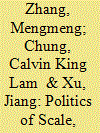

|
|
|
|
|
| Summary/Abstract |
The recent proliferation of China's railways has posed challenges to the dominance of the national-level railway authority on railway development. Since the 2000s, the planning of new railways has evolved into a politics of scale in which actors across multiple scales of government have bargained over railway alignment and station siting for their respective interests. This politics is shaped by the uneven bargaining powers of the contending state agents over railway planning. Interscalar division of regulatory oversight over strategic resources for railway development enables state agents at some scales to bargain more successfully, whereas variations in administrative and economic standing further differentiate the interscalar bargaining powers of municipal governments. Different results of bargaining across scales for each city have produced, as intercity railway planning in the Pearl River Delta illustrates, significant intercity variations in average travel times to the stations for the new railways that these cities share. Owing to the peculiar scalar distribution of the costs and benefits of the new railways, municipal governments with greater bargaining power have, contrary to traditional wisdom, bargained for less accessibility to intercity railway stations.
|
|
|
|
|
|
|
|
|
|
|
|
|
|
|
|
| 14 |
ID:
153560
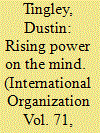

|
|
|
|
|
| Summary/Abstract |
A prominent explanation of war claims that international conflict can result when shifts in bargaining power induce the declining power to behave aggressively today because the rising power cannot credibly commit to not behave aggressively tomorrow. This paper asks whether individuals respond to shifting power in ways assumed by these models. Rather than use abstract laboratory-based bargaining games as in other work, I use vignettes describing the United States in an international bargaining situation to explore the microfoundations of power transitions models empirically. The vignettes vary whether the individual is a member of a declining or a rising power and whether there are previous public commitments to the status quo division of territory. Subjects propose a response the United States should make and then explain their decision in their own words. I apply new methods for analyzing these open-ended responses. Consistent with predictions from the behavioral literature, I find important asymmetries in behavior across these conditions as well as substantial heterogeneities in individuals' motivations for their decisions. The results of the experiments suggest potential ways that power-transition models should be refined to have a firmer behavioral basis.
|
|
|
|
|
|
|
|
|
|
|
|
|
|
|
|
| 15 |
ID:
129901
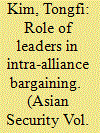

|
|
|
|
|
| Publication |
2014.
|
| Summary/Abstract |
This article develops a theory about the role of leaders in long-term international bargaining, specifically in the context of negotiations within existing military alliances. The international relations literature suggests that domestic opposition (to cooperation on a particular issue) increases a state's bargaining power vis-á-vis its negotiating partner. This study confirms that domestic opposition to cooperation generally increases a state's bargaining power at the international level, but it suggests that domestic opposition to the state's leader - which affects the leader's vulnerability - does not have a uniform effect on the country's bargaining power. It demonstrates the central role a state leader plays in international bargaining and explains the dynamics of alliance negotiations left unexplained in the literature. In order to examine the argument, this study uses "structured, focused comparison" of the U.S. alliances with Japan and Spain.
|
|
|
|
|
|
|
|
|
|
|
|
|
|
|
|
| 16 |
ID:
143399
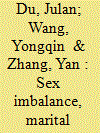

|
|
|
|
|
| Summary/Abstract |
This paper studies the effects of sex imbalance on matching patterns in China's marriage markets. We hypothesize that the economic inequality caused by economic liberalization, together with sex imbalance, will lead to women's hypergamy (marrying up). Employing CGSS data, our empirical findings support the hypothesis. We also establish that sex imbalance enhances the postnuptial bargaining power of the wife vis-à-vis the husband in intra-household resource allocation. The findings are robust to IV estimation and robustness checks.
|
|
|
|
|
|
|
|
|
|
|
|
|
|
|
|
|
|
|
|
|